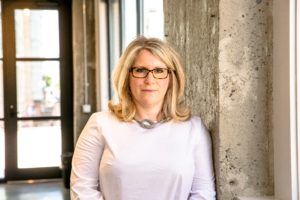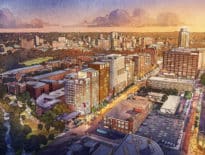Leslie Cohen
Title: COO, Samuels & Assoc.
Age: 44
Industry experience: 20 years
After turning Boston’s Fenway neighborhood into a new market for class A office space and luxury condominiums, Samuels & Assoc. is looking at other development frontiers in Boston. Leslie Cohen, the firm’s chief operating officer, led the 30-story Pierce Boston project that opened last winter overlooking Audubon Circle. Condos at Pierce Boston have sold for an average of $1,500 per square foot, with nine units still available. In September, Samuels & Assoc. formed a partnership with Boston-based Core Investments on Washington Village, a 656-unit residential and retail complex near Andrew Square in South Boston, which was approved in 2016 but has yet to break ground.
Q: How does Samuels & Assoc.’s entering into a partnership with Core Investments affect the timeline for groundbreaking of the Washington Village project in South Boston?
A: We’re early in the project, looking at the overall timeline and groundbreaking and construction. It’s a little early to articulate, but we’re hot and heavy into the making of the soup.
Q: Does Samuels & Assoc. plan to incorporate compact living units into future developments now that the Boston Planning and Development Agency has approved a two-year pilot program?
A: Definitely. We think it’s great. It really is in line with the city’s vision on more housing serving a wider population. In our buildings, we already are noticing a change in people not using apartments for work or play space. They’re using the amenity spaces more than ever before. The smaller living units play into that: just making the apartments functional for living and sleeping, and the rest of the spaces for social connections and being able to work. This opens up a lot of opportunities in the product that don’t have to be in the luxury price points.
Q: What were the internal discussions like about the changes to the Pierce project, such as the addition of the condo component? What gave you the confidence that the Fenway could be a luxury condo market?
A: For us, homeownership has always been a goal for the Fenway. Originally we thought it might happen when the neighborhood was more mature. When we started Pierce, the Van Ness had opened. We felt a different feeling in the neighborhood. You could walk out the door of the office and scratch your head: is there a ballgame or not? Because there was so much activity on the street. That was a really good sign that the place we were trying to create was happening.
That was one gateway milestone and measure point in terms of condos. And it’s a measure of risk. Prior to Pierce, the highest priced condo sold in the Fenway was $500,000. To bring a product that was starting at twice that required confidence in the neighborhood.
We’ve been working in this neighborhood for 20 years. People are looking for the simpler lifestyle in the city, but also want to be in a slightly edgier neighborhood surrounded by a lot of culture. In addition to the ballpark, you’ve got the Museum of Fine Arts and Isabella Stewart Gardner Museum and the BSO, so it appeals to a wide demographic. All the restaurants and education and culture and entertainment that have been created and exist in the Fenway gave us comfort in bringing in this product. We think it’s such a fabulous building and so different from anything around it.
Q: How many sky cabanas are available at Pierce Boston?
A: Eleven of the 12 are taken. It was a real flier for us: looking at this 30th-floor rooftop that doesn’t have mechanical equipment on it, how can we think differently about this space? We took a gamble but thankfully, there was a demand for it.
Q: Following the widespread adoption of the LEED standard, we’re seeing some new certifications for buildings emerge such as WELL and WiredScore. Do those enhance the value of a property?
A: As an owner, it’s in our best interest to really pay attention to this. Anything you can do that limits your operating costs is a good thing, and anything that impacts the environment in a positive way is good. We don’t necessarily find people come in and say, “Oh, this is a LEED-certified building, this is going to influence my decision.” Maybe we’re fortunate in Boston, we have the stretch code and you’re already meeting those requirements. But people are conscious of the energy costs, and it’s all moving in the right direction.
Q: How has your own role changed since being named chief operating officer in 2016?
A: I spend most of my day on the business end rather than working on projects. I spend a lot of time working on attracting and retaining talent. We work hard to train people, and we want people to have career development in the organization. That where much of my time is these days. Where do we want to grow our business, and thinking strategically: what do we want to be in five or 10 years?
I think geographically, we’ve really recognized that we do well when we come into a community and build within that community, similar to Fenway. We’re looking to do the same with Allston and Washington Village. Our strengths lie in developing relationships, and working as a partner with the community. On product type, one of the great things about working with Steve Samuels is he’s never interested in doing the same thing twice. Our options are open. We’re fortunate to have experience in multifamily and condos and retail and office and hotels, and it really allows us to be nimble in terms of the market and its needs.
Q: How would you characterize the progress of women in leadership roles in the local CRE industry during your career?
A: I’ve been in real estate for 20-plus years and the difference is back then I was often the only woman in the room. Today women are representing all the different fields of real estate. It’s been a great change. Younger women are getting into finance and development, in areas you traditionally didn’t see them. Personally, CREW (Commercial Real Estate Women) played a big role in my career development, opening up opportunities to serve on the boards of other organizations.
Q: If you weren’t in real estate, what would be the most likely career for you?
A: Now that I’m in the COO role, that’s a role that I really find I enjoy: the working on the company, the strategy piece and the process of thinking about how we can become more efficient. I probably would be doing that in some other areas. Those are pretty transferable skills.
Cohen’s Five Favorite Vacation Spots:
- Martha’s Vineyard
- Santa Monica
- New York City
- Los Cabos, Mexico
- Miami




 |
| 

